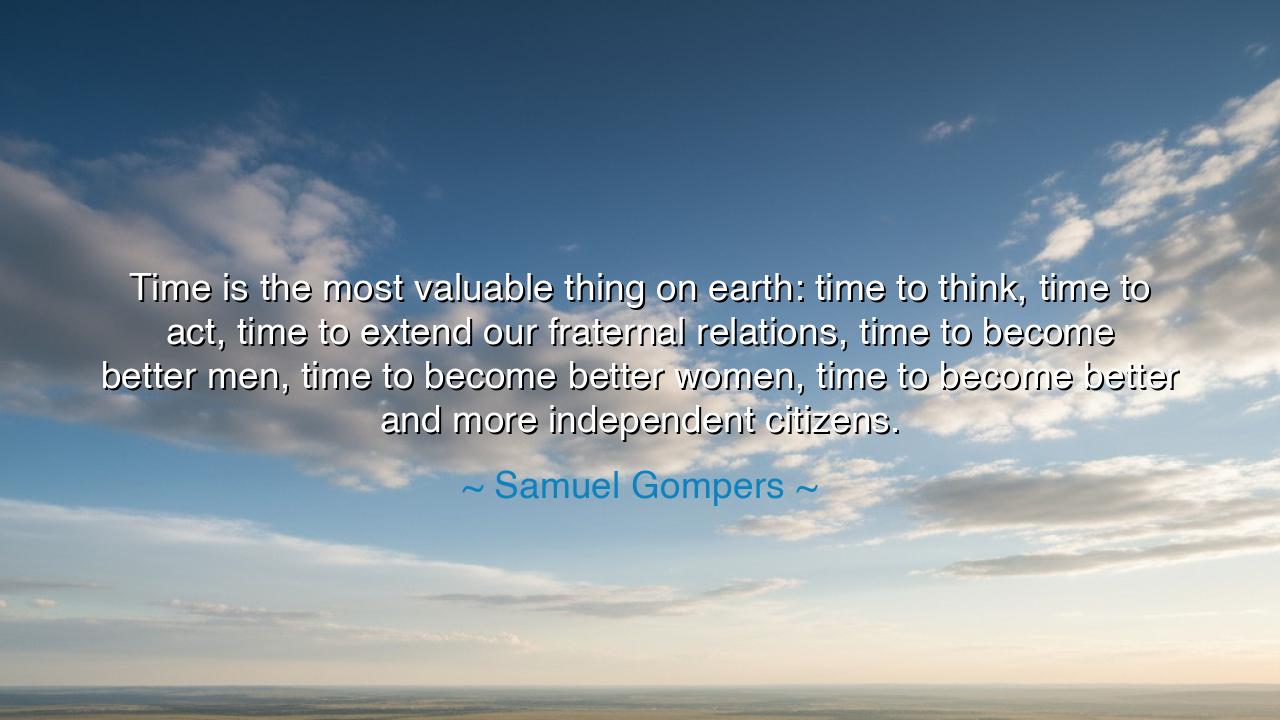
Time is the most valuable thing on earth: time to think, time to
Time is the most valuable thing on earth: time to think, time to act, time to extend our fraternal relations, time to become better men, time to become better women, time to become better and more independent citizens.






Hear, O children of labor and destiny, the voice of Samuel Gompers, who proclaimed with the gravity of a prophet: “Time is the most valuable thing on earth: time to think, time to act, time to extend our fraternal relations, time to become better men, time to become better women, time to become better and more independent citizens.” These words, uttered not by a philosopher in a cloister, but by a leader in the struggle of workers, rise with the power of truth. For Gompers knew that beyond wealth, beyond power, beyond possessions, it is time that is the true treasure of mortals, the currency by which freedom and greatness are purchased.
The origin of this saying comes from Gompers’s life as the founder of the American Federation of Labor. He fought not merely for wages, but for dignity—the right of men and women to live as more than machines, chained to endless toil. To him, the demand for shorter working hours was not idleness but liberation: liberation of time. For with time, the worker could think, learn, love, dream, and build a greater world. Without it, even gold was worthless, for life itself was consumed in drudgery.
Consider the struggle of the laborers of the nineteenth century. They worked fourteen hours a day, six or seven days a week, with no time for family, no time for learning, no time for the soul. It was a life of exhaustion, bodies bent before their years. But when the labor movement rose, when men and women marched for the eight-hour day, they were marching not only for wages, but for time. Out of that struggle came space for education, for civic participation, for art, for family—for the fullness of being human. Gompers’s words remind us that this was the truest victory: the reclaiming of life’s hours.
The meaning of this teaching stretches beyond the field of labor. Time to think—for without reflection, the soul drifts aimlessly, never asking why it lives. Time to act—for thought without action is barren, and courage delayed is courage denied. Time to extend fraternal relations—for life is not lived alone, but in brotherhood and sisterhood, where bonds of solidarity weave strength against oppression. Time to become better men and women—for the purpose of existence is growth, not stagnation. And time to become better citizens—for no people can be free unless they have hours to engage in the duties of freedom.
History offers shining examples. Think of Nelson Mandela, who spent long decades in prison. Though his body was confined, he claimed his time as his own. He used it to think, to read, to prepare himself for leadership. When freedom came, he was ready—not broken, but strengthened. He proves that even when robbed of liberty, the wise steward of time can turn years of confinement into preparation for greatness. His life stands as testament to Gompers’s vision: that time is the soil from which better men and women are grown.
The lesson is thus: do not squander your time, nor let it be stolen by forces that reduce you to less than human. Guard it fiercely, for it is your true wealth. Use it not only for labor, but for reflection, for family, for fellowship, for the pursuit of justice. To misuse time is to betray your birthright; to use it well is to build a life worthy of memory.
Practical counsel is clear. Set aside hours not only for work, but for thought and growth. Devote time each day to learning, for the mind must be fed. Devote time to service, for citizenship is strengthened in action. Devote time to love, for relationships are the roots of life’s tree. And above all, do not waste your hours in aimless distraction, for they are the jewels of existence, once gone, never to return.
So let Gompers’s words echo across the generations: “Time is the most valuable thing on earth.” Treasure it, spend it wisely, and demand it boldly. For in time lies the seed of freedom, the power of growth, and the promise of a better world. He who knows how to live his hours becomes more than a laborer, more than a citizen—he becomes a true participant in the eternal work of human progress.






AAdministratorAdministrator
Welcome, honored guests. Please leave a comment, we will respond soon